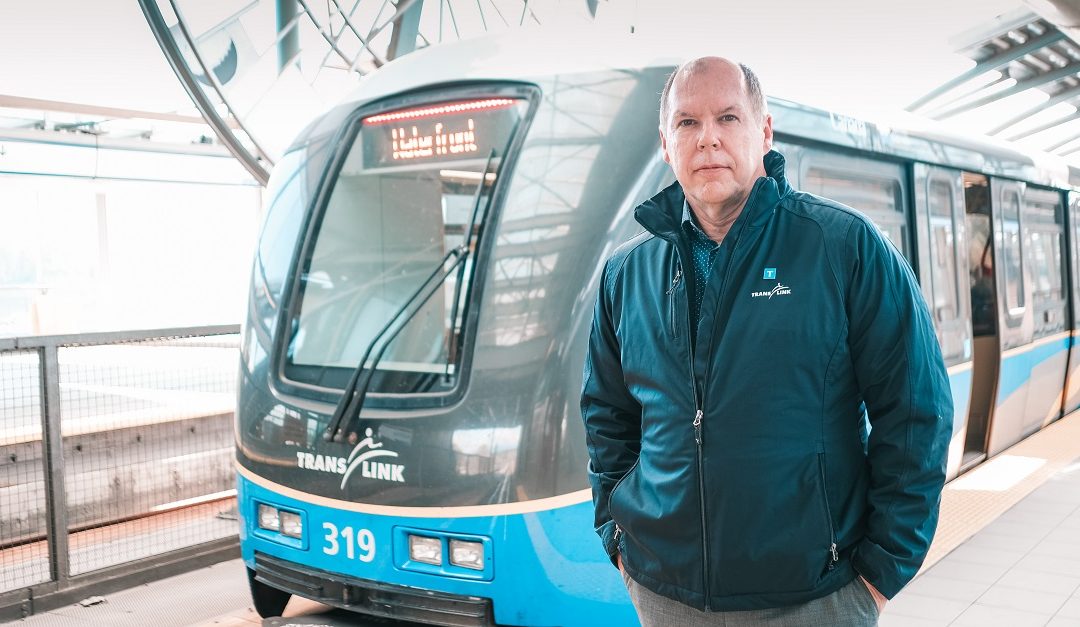By Natalie Bruckner. Originally published in the Winter 2019 edition of Business Class magazine.
This Q&A was originally published alongside the article The Future of Public Transit in BC.
What is your title?
I am the vice president, communications, marketing and public affairs at TransLink.
We understand you are BC born and raised?
I was born and raised in North Vancouver. I’m married with three boys—the oldest has just finished the BCom program at UVic.
Can you sum up what TransLink does?
We finance, build, manage and operate an integrated regional transportation system that moves up to 500,000 people every single day, and connects 23 communities by bus, SkyTrain rapid transit, commuter rail (West Coast Express), passenger ferry (SeaBus), on-demand service for people with disabilities, as well as pedestrian and cycling paths, major roads and five bridges.
How did you enter into the transportation sector?
I joined TransLink in 2017 after 10 years as Chief Communications Officer for BC Hydro. TransLink was coming off the most painful period in its history. It had a new CEO, a passionate board that was dedicated to reviving the organization, and a renewed commitment from all levels of government to improve transportation in Metro Vancouver. I was offered an opportunity to create a new strategy, rebuild the team, and renew the brand—I couldn’t turn it down.
Can you tell us why you chose an MBA and how it has helped in your career?
I saw an MBA as something I needed to do to take the next step in my career. Up to that point I had worked in journalism and politics, and I had taken on leadership and management roles, but without any formal training. If I wanted to take on larger roles, I had to dedicate myself to deliberately learning the art and science of leadership and management.
What would your advice be to grads wanting to enter the transportation sector?
There is a big focus on planning and operations in the transportation sector. So if those are fields that interest you as a graduate, transportation offers some great opportunities to develop a career. I would add another piece of advice: learn strong communication skills. If you want to progress in any career, it’s essential to learn how to communicate and work with your colleagues, your teams and your customers.
What are the unique challenges transportation faces here in BC?
Like most other sectors, we are facing the challenge of new technology, new entrants in the market and the need to be more sustainable in everything we do. Making transit fast and frequent and convenient makes people more likely to choose transit. But how do you pay for it all? Transportation infrastructure has a big price tag and paying for it is one of the toughest challenges facing public policymakers today.
What are you excited about moving ahead?
We are in the midst of a massive public engagement effort called Transport 2050, which is seeking public input on what the next 30 years of transportation should look like in Metro Vancouver. So we’re focusing right now on what the public wants and what they want the future to look like.
What’s your favourite route?
I’m a frequent SeaBus rider. It’s an incredibly convenient way to get between the North Shore and downtown Vancouver. And it’s a beautiful ride.
And finally, where can we find you in your spare time?
I spent the last decade coaching soccer so I still enjoy watching my sons playing for the North Vancouver Football Club. Otherwise, you will find me at a gym or obsessively trying to complete New York Times’ crosswords.
Related reading: The Future of Public Transit in BC | Q&A with Erinn Pinkerton, CEO of BC Transit
Photo: Courtesy of Steve Vanagas


